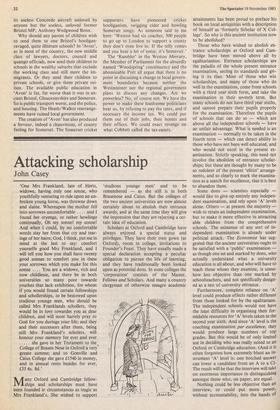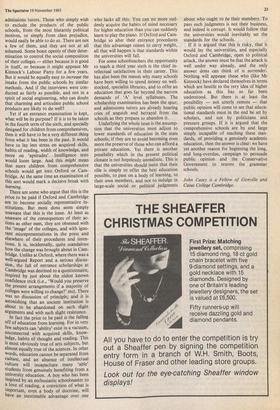Attacking scholarship
John Casey
sonne You are a widowe, rich and now childlesse, and there be in both universities so many pore towarde youthes that lack exhibition, for whom if you would found certain fellowships and schollerships, to be bestowed upon studious younge men, who should be called Mrs Franklands schollers, they would be in love towardes you as dear children, and will most hartely pray to God for you duringe your life; and they and their successors after them, being still Mrs Frankland's scholers, will honour your memory for ever and ever she gave in her Testament to the College of Brasen Nose in Oxford a very greate summe; and to Gonville and Caius College she gave £1540 in money, and in annual rents besides for ever, £33 6s. 8d.'
Many Oxford and Cambridge fellow- ships and scholarships must have been founded ix circumstances as tragic as Mrs Frankland's. She wished to support 'studious younge men' and to be remembered — as she still is in both Brasenose and Caius. But the colleges of the two ancient universities are now almost certainly about to abolish their entrance awards; and at the same time they will give the impression that they are rejecting a cer- tain idea of education.
Scholars at Oxford and Cambridge have always enjoyed a special status and privileges. They have their own gown (at Oxford), room in college, invitations to Founder's Feast. They have usually made a special declaration accepting a peculiar obligation to pursue the life of learning; and they have traditionally been looked upon as potential dons. In some colleges the 'corporation' consists of the Master, Fellows and Scholars. And many a country clergyman of otherwise meagre academic
attainments has been proud to preface his book on local antiquities with a description of himself as 'formerly Scholar of X Col- lege'. So why is this ancient institution now to be abolished?
Those who have wished to abolish en- trance scholarships at Oxford and Cam- bridge have been moved above all by egalitarianism. Entrance scholarships are the paladin of the whole present entrance examination, setting its standards and giv- ing it its elan. Most of those who win scholarships, and many of those who do well in the examination, come from schools with a third year sixth form, and take the examination in their seventh term. But many schools do not have third year sixths, and cannot prepare their pupils properly for the examination. Therefore the pupils of schools that can do so — which are above all the independent schools — have an unfair advantage. What is needed is an examination — normally to be taken in the fourth term — which can detect ability in those who have not been well educated, and who would not excel in the present ex- amination. Strictly speaking, this need not involve the abolition of entrance scholar- ships; tut these are thought by many to be so redolent of the present 'elitist' arrange- ments, and so clearly to mark the examina- tion as a search for excellence, that it is best to abandon them.
Some dons — scientists especially would like to give up entirely any indepen- dent examination, and rely upon 'A' levels alone. Others — at present the majority — wish to retain an independent examination, but to make it more effective in attracting able children from the comprehensive schools. The existence of any sort of in- dependent examination is already under political attack. The Economist has sug- gested that the ancient universities ought to be satisfied with a 'public' examination — as though one set and marked by dons, who actually understand what a university education is all about, and who will have to teach those whom they examine, is some- how less objective than one marked by schoolteachers, and not specifically design- ed as a test of university entrance.
Furthermore, complete reliance on 'A' level could produce effects rather different from those looked for by the egalitarians. The independent schools would not have the least difficulty in organising their for- midable resources for 'A' levels taken in the second year sixth. And since 'A' level is the coaching examination par excellence, they would produce large numbers of top grades. But this would be of only limited use in deciding who was really suited to an Oxford or Cambridge education. (And it is often forgotten how extremely blunt an in- strument 'A' level is: one botched answer can lower a candidate from an A to a C). The result will be that the interview will take on enormous importance in distinguishing amongst those who, on paper, are equal.
Nothing could be less objective than an interview, or could put more power, without accountability, into the hands of
admissions tutors. Those who simply wish to exclude the products of the public schools, from the most blatantly political motives, or simply from class prejudice, would easily be able to do so. There are not a few of them, and they are not at all ashamed. Some boast openly of their deter- mination to control the social composition of their colleges — either because it is good in itself, or because it might appease Mr Kinnock's Labour Party for a few years. But it would be equally easy to increase the intake from the public schools by similar methods. And if the interviews were con- ducted as fairly as possible, and not in a spirit of social engineering, who can doubt that charming and articulate public school products are likely to do well?
Yet if an entrance examination is kept, what will be its purpose? if it is to be taken in the fourth term of the sixth, and specially designed for children from comprehensives, then it will have to be a very different thing from what it has been in the past. It would have to lay less stress on acquired skills, habits of reading, width of knowledge, and more on 'aptitudes'. Intelligence tests would loom large. And this might mean that more children from comprehensive schools would get into Oxford or Cam- bridge. At the same time an examination of this sort would mark a decisive break with learning.
There are some who argue that this is the price to be paid if Oxford and Cambridge are to become socially representative in- stitutions. But most dons seem simply unaware that this is the issue. At least as unaware of the consequences of their ac- tions as other men, they are obsessed with the 'image' of the colleges, and with igno- rant misrepresentations in the press and elsewhere of their procedures and inten- tions. It is, incidentally, quite scandalous how the change was brought about in Cam- bridge. Unlike at Oxford, where there was a well-argued Report and a serious discus- sion, the fall of entrance scholarships at Cambridge was destined to a questionnaire, inspired by just about the oldest known confidence trick (i.e., 'Would you preserve the present arrangements if a majority of colleges were willing to change?' etc). There was no discussion of principle; and it is astonishing that an ancient institution is about to be abandoned on such slight arguments and with such slight resistance.
In fact the price to be paid is the falling off of education from learning. For in very few subjects can 'ability' exist in a vacuum, unconnected with acquired skills, know- ledge, habits of thought and reading. This is most obviously true of arts subjects, but almost equally true of the sciences. In other words, education cannot be separated from culture, and an absence of intellectual culture will incapacitate many 'able' students from genuinely benefiting from a university education. A boy who has been inspired by an enthusiastic schoolmaster to a love of reading, a conviction of what is important, even a body of doctrine, will have an inestimable advantage over one
who lacks all this. You can no more sud- denly acquire the habits of mind necessary for higher education than you can suddenly learn to play the piano. If Oxford and Cam- bridge so alter their entrance procedures that this advantage ceases to carry weight, all that will happen is that standards within the universities will fall.
For some schoolteachers the opportunity to teach a third year sixth is the chief in- tellectual satisfaction in their career. This has also been the reason why many schools have been willing to spend money on well- stocked, specialist libraries, and to offer an education that goes far beyond the narrow demands of 'A' level syllabuses. The scholarship examination has been the spur; and admissions tutors are already hearing cries of anguish and betrayal from the schools as they prepare to abandon it.
Underlying the whole issue is the assump- tion that the universities must adjust to lower standards of education in the state schools, if they are to avoid becoming even more the preserve of those who can afford a private education. Yet there is another possibility which in the present political climate is not hopelessly unrealistic. This is that the universities should insist that their role is simply to offer the best education possible, to pass on a body of learning, to their own members, and not to indulge in large-scale social or political judgments
about who ought to be their members. To pass such judgments is not their business, and indeed is corrupt. It would follow that the universities would inevitably set the standards for the schools.
If it is argued that this is risky, that it would lay the universities, and especially Oxford and Cambridge, open to political attack, the answer must be that the attack is well under way already, and the only answer dons can think of is surrender. Nothing will appease those who (like Mr Kinnock) have declared themselves in terms which are hostile to the very idea of higher education as this has so far been understood. But there is at least the possibility — not utterly remote — that public opinion will come to see that educa- tional standards must in the end be set by scholars, and not by politicians and pressure groups. If it is argued that the comprehensive schools are by and large simply incapable of reaching these stan- dards, of providing a genuinely academic education, then the answer is clear: we have yet another reason for beginning the long, and long-overdue, campaign to persuade public opinion and the Conservative Government to restore the grammar schools.
John Casey is a Fellow of Gonville and Caius College Cambridge.



























































 Previous page
Previous page